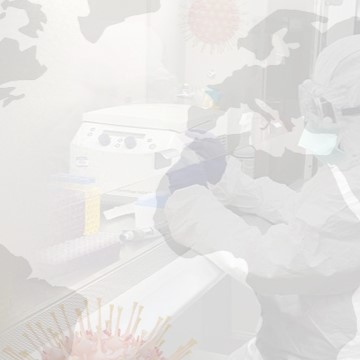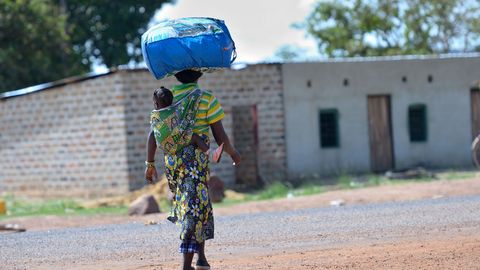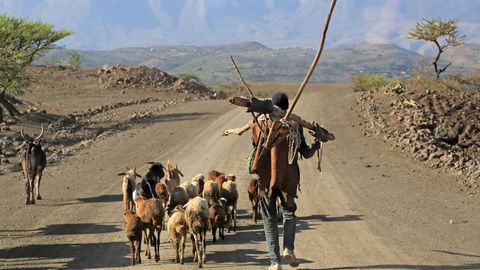

COVID-19
COVID-19 Research Activities at Swiss TPH
Swiss TPH has played a unique role in the response to COVID-19. We collaborated with multiple institutions and organisations, sharing our knowledge of disease transmission, virology, intervention strategies and more. These collaborations have widespread benefits for individuals in both Switzerland and abroad.
Research Coalitions
Swiss TPH experts have contributed to the Swiss National COVID-19 Science Task Force, a national scientific advisory board set up specifically for the COVID-19 pandemic, and supported Corona-Immunitas, a programme run by the Swiss School of Public Health (SSPH+), which tested the proportion of people in Switzerland with antibodies to the Corona virus.
On an international level, Swiss TPH joined the COVID-19 Clinical Research Coalition as one of 70 institutions to respond to COVID-19 in resource-poor setting.
Antibody Testing
Swiss TPH carried out the COVCO-Basel study, a long-term study on the effects of the coronavirus pandemic in the cantons of Basel-Stadt and Basel-Landschaft. The study contained both a digital survey that looks at the effects of COVID-19 on individual’s quality of life, such as mental health repercussions, as well as antibody testing (a seroprevalence study).
In collaboration with the canton of Basel-Landschaft and ETH Zurich, a validation study on COVID-19 antibody tests was carried out at the Diagnostic Centre of Swiss TPH in the second quarter of 2020.
New Diagnostic Tools and Prophylactic Treatments
In the MistraL project artificial intelligence, chest X-ray and antigen-based diagnostic tests are combined to enable and improve diagnosis of COVID-19 patients in low-income settings.
The aim of the DAVINCI project is to develop a simple, low-cost device that can detect antibodies against SARS-CoV-2, using saliva. The project seeks to identify individuals who have been previously infected with SARS-CoV-2 and to provide novel insights into the variations in the immune response to COVID-19. Both projects are financed by the Botnar Research Centre for Child Health Care (BRCCH).
Together with the University of Geneva, Swiss TPH conducted an open-label cluster randomised trial, the COPEP trial, to assess the efficacy, safety and acceptability of same-day LPV/r-based post-exposure prophylaxis compared to standard of care for asymptomatic individuals exposed to individuals diagnosed with SARS-CoV-2.
As part of the NIIDS project, Swiss TPH and partners are developing a novel integrated infectious disease diagnosis and surveillance system to improve triage, diagnosis and management of diseases in migrants and refugees in Ethiopia. The project is assessing major healthcare needs, as well as setting up a platform to support the diagnosis and management of clinically relevant infectious diseases, including COVID-19. The NIIDS project also collects evidence on non-communicable diseases (NCDs), mental health, reproductive health, nutritional deficiencies and infectious diseases. The data serve as a basis to inform clinical guidelines, design interventions and validate novel versatile diagnostic platforms, such as a sophisticated digital urine sensor device for rapid disease severity assessment. The project is funded by the Stanley Thomas Johnson Foundation.
Mathematical Modelling
The MODCOVID project, financed by BRCCH, seeked to harness mathematical modelling and machine learning approaches to guide and optimize clinical and public health strategies in the emergency response to the COVID-19 pandemic.
Epidemic models are essential tools to coordinate all aspects of the response to pandemics. Models can inform policy makers on strategies for vaccinations and testing, and trigger mitigation measure such as the ‘lockdowns’. Swiss TPH experts propose to use and further develop a well-established technology to simulate epidemics with considerably increased temporal and spatial resolution. The Agent-based Tracking of Disease Spread project is financed by the Swiss National Science Foundation (SNSF) and a collaboration with the ETH Zurich, the University of Applied Sciences in Northwestern Switzerland (FHNW) and other partners.
The Swiss TPH Disease Modelling unit developed a new mathematical model – OpenCOVID – to compare multiple vaccine rollout scenarios with several phased relaxation strategies to explore the potential impact and interaction on the future dynamics of SARS-CoV-2 in Switzerland. They looked at when and how containment measures could be relaxed during different levels of a vaccine rollout to prevent or limit a potential surge in confirmed cases, hospitalisations, intensive care admissions and deaths. The model also took into account the impact of new variants, vaccine properties and vaccine hesitancy and was developed to support a range of current and future interventions to tackle the SARS-CoV-2 pandemic in Switzerland and abroad. OpenCOVID is funded by BRCCH and SNSF.
Clinical Trials
The ANTICOV clinical trial, a consortia led by DNDi with partners including Swiss TPH, aimed to respond to the need to identify treatments that could be used to treat mild and moderate cases of COVID-19 early and prevent spikes in hospitalizations that could overwhelm fragile and already overburdened health systems in low-resource settings. One of the largest multi-country trials focusing exclusively on mild and moderate cases of COVID-19, ANTICOV helped address the relative neglect of clinical research during the COVID-19 pandemic in Africa, Asia, and Latin America. ANTICOV employed an innovative ‘adaptive platform’ trial design which allowed the consortium to add or remove treatments as evidence emerged.
Understanding Public Perception of the Coronavirus
PubliCo, an experimental online platform for COVID-19 related public perception financed by the Swiss National and Science Foundation SNSF, developed a tool to help tackle the “infodemic” manifested in the COVID-19 context. The tool aimed to promote effective and tailored risk and crisis communication to combat misinformation, stigma and fear. The project was led by the Institute of Biomedical Ethics and History of Medicine (IBME) at the University of Zurich, with Swiss TPH being responsible for the citizen science component where people report on their COVID-19-related experiences.
Governing Systemic Crises in the 21st Century
In collaboration with the Global Studies Institute of the University of Geneva, Swiss TPH researchers assessed the initial impact of and responses to the current COVID-19 systemic crisis from an interdisciplinary perspective combining insights from public health, economics and law. In particular, the project seeked to understand how different European countries cope, adapt and transform in the face of systemic disruptions such as those caused by the rapid dissemination of COVID-19 across Europe.
International Collaborations
In the EU-funded CORESMA project, Swiss TPH led the implementation research to analyse effects of surveillance and containment measures through SORMAS and to tailor effective and efficient control measures to health systems realities in Nepal and Côte d'Ivoire. Combining e-health, serolomics, modelling, artificial intelligence and implementation research, CORESMA aimed to close existing gaps between clinical, epidemiological and immunological information in order to better respond to the pandemic.
The EXPAND project aimed to expanding neglected tropical diseases (NTDs) and COVID-19 surveillance and control to mobile pastoralists in Chad through the establishment of integrated surveillance and access to health information and services. It also works towards the prevention and treatment of COVID-19 and NTDs in the mobile pastoralist populations. Funding was provided by the ASCEND Learning and Innovation Fund, sponsored by FCDO (previously DfID).
Supporting Our Partners
In many of our existing projects, we increased the focus of our activities towards the prevention and control of COVID-19.
Swiss Agency for Development and Cooperation Projects
The Swiss Agency for Development and Cooperation (SDC) supported the reallocation of funds within existing projects that are implemented by Swiss TPH in Africa, Central Asia and Eastern Europe to assist in the public health response to the COVID-19 crisis. Activities ranged from the establishment of a national call centre, procurement, distribution and training on the use of personal protective equipment, to setting up a diagnostics laboratory, training of PHC staff on remote consultations, and communications work to dispel fake news. Local authorities and the social sector were engaged to ensure support for the most vulnerable, and many interventions were adapted to meet the requirements of physical distance. Project countries included Tanzania, Moldova, Kosovo, Albania, Tajikistan, Ukraine, Ethiopia and Chad in which Swiss TPH has been working for many years and has long-term partnerships.
In addition, a new project in Rwanda was launched by SDC and implemented by Swiss TPH to improve the capacity of community health workers to inhibit, detect and respond to COVID-19.
Rapid Assessment of World Bank COVID-19 Projects
The World Bank supported around 100 country responses to COVID-19 through loans and grants totaling over USD 6 billion. Funding was based on the Multi-phase Programmatic Approach (MPA) model or through restructuring existing projects. Swiss TPH was mandated to assess how far the COVID-19 projects under the MPA framework have reached their overarching objective to contribute to prevention, detection and response to COVID-19 and strengthen national health systems.
Support to the Global Fund
The Global Fund provided an immediate funding of USD 500 million to help countries fight COVID-19. As part of its 14 mandates from the Local Fund Agent, Swiss TPH reviewed revised detailed budgets and protocols, the relevance and effectiveness of savings identified by countries, and detailed assumptions for new COVID-19-related activities, best value for money investments, and conducted short local surveys on quality and price of protective equipment.


